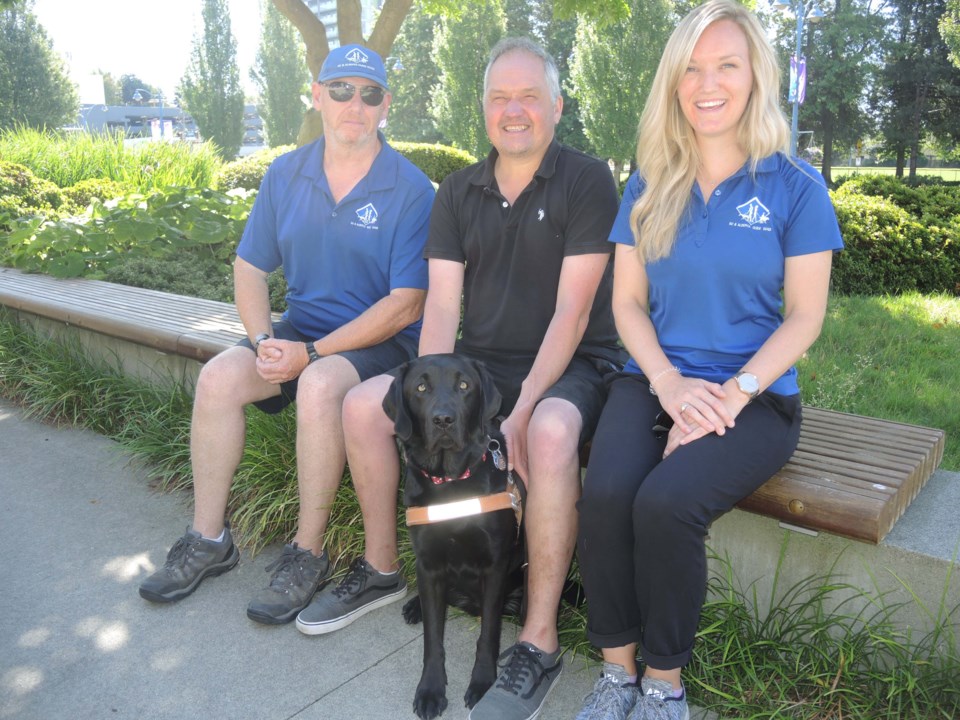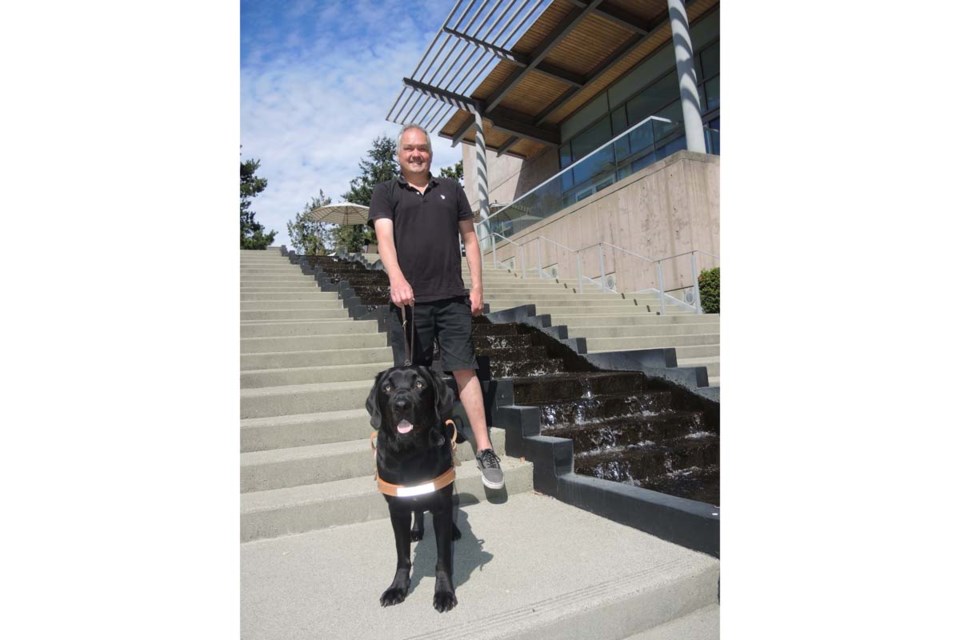One thing’s for sure, Mark Hicks is going to get around Richmond city centre a lot faster than he’s been able to recently.
For the last six months, Hicks – who has been totally blind for 15 years due to diabetes – has had to feel his way through the busy precinct armed only with his cane.
As of Friday, however, he was back on the trail, pounding the familiar path to the likes of his barber shop, bank or his parents’ home, all thanks to his new teammate and guide dog, Winston.
After Hick’s last guide dog, Leamy, passed away earlier this year, 17-month-old black Labrador Winston - who was born, bred and trained for the job by BC Guide Dogs’ in-house program - was “matched” for size and speed with his new owner in April.
Winston then went back to the charity to continue his intensive, 20-week (90 hours) of training before being reunited with 45-year-old Hicks three weeks ago to complete his graduation as a guide dog.
And it was on Friday, about five minutes before the pair met with the Richmond News, that they passed their final test, with flying colours, to officially become “Team Winston-Hicks.”
“Leamy was more casual, Winston really goes for it. He’s so keen,” beamed Hicks about his new companion and teammate.
“I’m getting (to places faster now), oh yes, absolutely. Being without the dog really takes away your independence. I’m pretty good with my cane, but it is tedious and very limiting.
“(The guide dog) gives you confidence to go wherever you want, not trudging along with your cane. You’re sort of hitting everything you want to avoid. But with your guide dog, you’re avoiding everything.
“Crossing (the road) with a cane, you have to make sure you’re not going too far to the left or right. With Winston, you tell him to go straight across and he’s straight across the road.”

On Friday, Hicks admitted to being nervous about the test, even though no one has apparently ever failed it.
The most important thing, added Nick Toni, one of the BC Guide Dogs mobility instructors who trained Winston, is “their safety. If something doesn’t go right, can they get out of it?”
Prior to the final test, Toni told how he and apprentice instructor Kelsi Manton talked Hicks through it while out walking with Winston, giving him pointers along the way.
“We also use smells and sounds for Mark to identify where he is on his route,” said Toni.
“And then, further along the line, we will drop back a bit and let them get on with it. Then Mark can relax a bit and let Winston do his work. They very much work as a team.
“And Winston is very good at finding his objectives. We actually have to be very careful with him. He’s very switched on and we don’t use the word ‘find too much, otherwise he starts finding everything at the same time.”
Toni said it was clear at an early age that Winston was more than “good enough to be a guide dog." (Those pups deemed unsuitable get trained for other duties, such as for autism or PTSD purposes)
“Our dogs are very task-driven. Rather than a handler giving them a task, they have to take the initiative, so to speak, because their handlers are blind.
“(Winston) had to show he had the drive. We need a dog that’s prepared to step out ahead of the handler and make decisions. We teach it to negotiate around obstacles, such as sandwich boards and test their temperament. We don’t want dogs that are easily distracted.”
In case you were wondering, when guide dogs such as Winston aren’t working, they get to do all the fun things “unemployed” dogs do.
“When his harness comes off. He’s so playful and loving and he’s got toys he plays with. He’s a pet with rules. He still wants to have fun,” said Hicks.
“And he still gets to run free at off-leash parks, when I go with friends. He still gets to do dog things.”
The charity - which is funded solely through donations and doesn’t charge a cent to its handlers - estimates it costs about $35,000 to breed, raise, train and support a guide dog throughout its life, including taking care of any veterinary bills.
By the end of 2019, they are hoping to have graduated their 134th guide dog team, 59th autism support dog team and 50th PTSD service dog team. Hicks and Winston are team #132.
Last year, BC Guide Dogs graduated 28 dogs and next year, they’re aiming for 42 dogs from their three programs.
If you’d like to donate, go online to BCandAlbertaGuideDogs.com.



